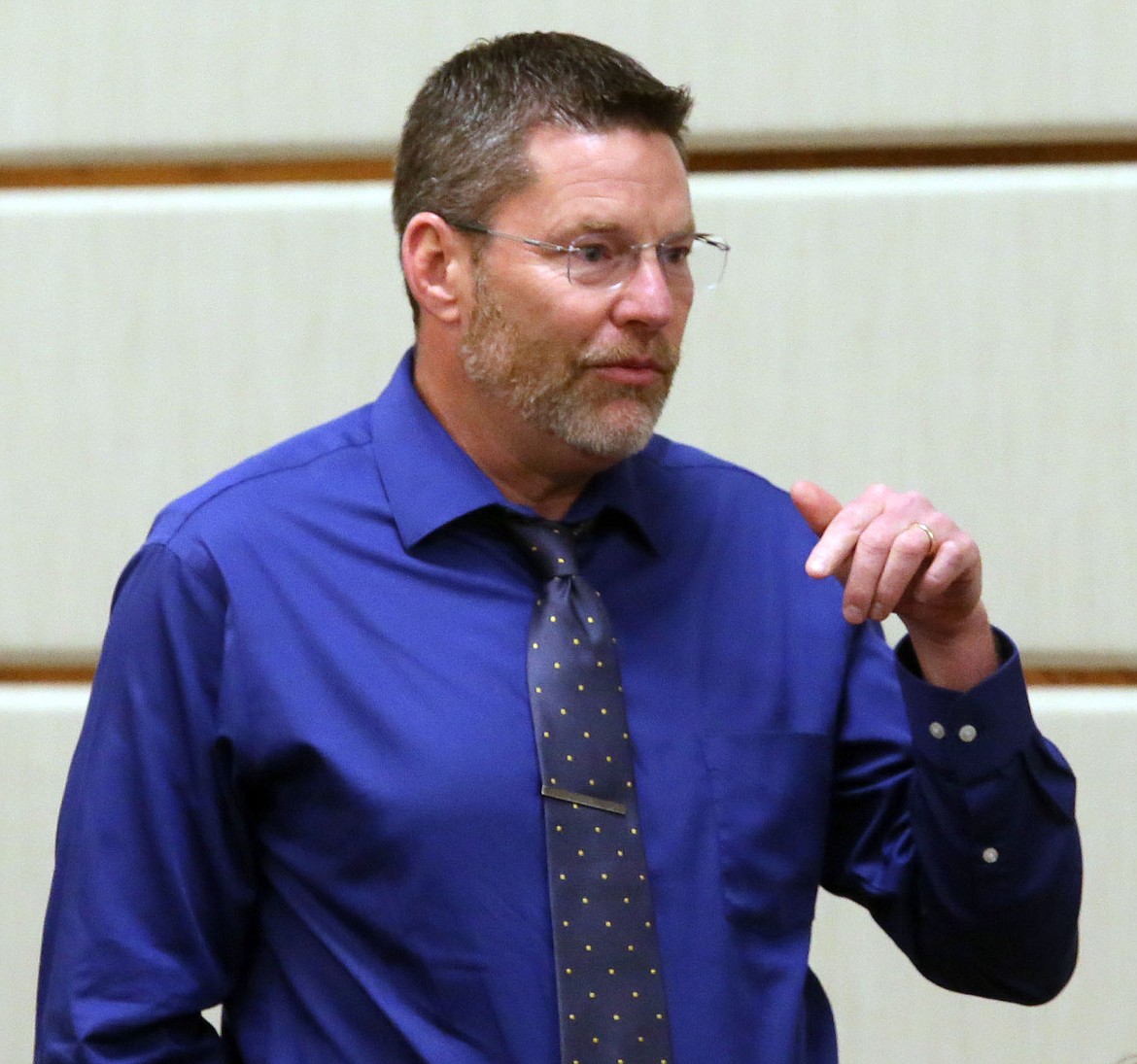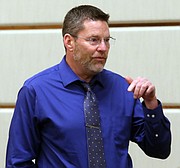New funding formula needed, say locals
COEUR d’ALENE — The state’s funding formula for public education has to be scrapped, said audience members at a forum here Tuesday night. Hosted by consultants with the Denver-based nonprofit Education Commission of the States, the event is one of several taking place across Idaho this month as part of work by the state Legislature’s public school funding formula committee. The committee was formed by order of the state Legislature in 2016 to study and make recommendations related to the school funding formula. The committee, in turn, hired ECS.
School district trustees, teachers, and former educators came from as far as St. Maries and Priest Lake to offer their opinions.
New Coeur d’Alene School District Superintendent Steve Cook said he hoped to see the current funding formula disappear. The current system seems like old technology, he said. It shouldn’t be tinkered with and perfected — it should be replaced, said Cook. He hoped a new system would offer more flexibility and autonomy to local districts and reduce state mandates.
Former Coeur d’Alene educator Mary Ruch said the funding formula needs to take into consideration money for new schools and for maintaining current schools. She said state surplus money should go into that, not into tax cuts.
Post Falls School District trustee Michelle Lippert agreed that districts need money for building new facilities. She also said that supplemental levies should be renamed “essential levies,” since without them many districts would have to make drastic adjustments.
Beth Dennis, who teaches in the Post Falls School District, told ECS consultants that the state’s funding formula ought to include money for classroom costs which teachers often pay out of their own pockets — such as pencils, paper, and markers.
Coeur d’Alene Education Association chief Bruce Twitchell denounced the current state funding formula wholesale. “Funding based on attendance is massively wrong and disgusting in my opinion.” Whether or not the kids show up, you still have costs to pay such as lights, books, and heat, he explained. Like many others in attendance, he also condemned the overall level of state funding for public education.
Coeur d’Alene School District trustee Tom Hearn put the blame for state funding on state legislators, including many of those here in Kootenai County. Without naming specific legislators, Hearn said that if you looked at many of their campaign websites you’d find statements of support for homeschooling, private schooling, church schools, and perhaps charter schools — but not much support for traditional public schools. “Vote for candidates who will increase the size of the pie,” said Hearn. Nothing really dramatic will change until the state capitol is full of legislators who are “truly committed to public education,” he explained.
Parent Brittany Bryson called on the funding formula to be student-centered. Her son goes to Coeur d’Alene schools and she wants him to be able to compete in a 21st-century global economy, she said. Money needs to be put towards teachers who can shape him to achieve that goal, she said.
“Teacher pay in Idaho, as far as I’m concerned, stinks,” added St. Maries Joint School District trustee Pete Dirlam, from Santa.
Participants from the Kellogg School District repeatedly pointed out the different needs that rural schools in North Idaho have. Coeur d’Alene School District trustee Casey Morrisroe seconded that sentiment. Boise schools don’t have to resort to supplemental levies like schools here do, he said, whether it’s a smaller district like Kellogg and St. Maries or a larger one like Coeur d’Alene. Legislators in Boise need to “Find something that’s equal for everyone that has some consistency,” he said.
ECS school finance specialist Michael Griffith told audience members he was confident that the state’s funding formula would change from attendance-based to enrollment-based. He also anticipated that the funding formula would be less top-down and would provide local school districts with more freedom. However, he joked, the consultants’ role was akin to that of a caddy on a golf course. The state Legislature holds the real decision-making power over the funding formula.
“We’re like a caddy. We can recommend a club, but if the legislature chooses to tee off with a putter, then they will tee off with a putter,” he said.
The magic will happen live during a five-hour committee meeting on July 18, explained Griffith. The big building blocks of Idaho’s public school funding formula will get worked out then, with details to be worked out at subsequent committee meetings later in the fall. North Idaho’s lone representative on the committee is Rep. Sage Dixon from Ponderay.
According to the Coeur d’Alene School District’s 2018 certificated salary schedule, the base salary for a first-year teacher with a bachelor’s degree is $34,600. The top certificated salary is $61,775 for a teacher with a bachelor’s degree plus 70 additional hours of college classes, and 15 years or more in the district. Health and vision benefits can total up to $10,324 more per year, plus a $105 life insurance benefit. Longevity stipends for service of 15-24 years or more range from $875 to $2,650 annually. A master’s degree brings an additional $1,853 per year, while a doctorate nets an additional sum of $3,706 annually.
The Legislature’s contract with consultants from ECS is worth $248,450, said Robyn Lockett, budget and policy analyst with the Legislative Services Office in Boise. The public school funding formula committee’s budget for fiscal year 2019 is $300,000, Lockett said.
Griffith invited the public at large to take an online survey on the state funding formula at bit.ly/2xrPBaq. Information can also be emailed to IdahoSchoolFunding@ecs.org.



